How To Become A Tattoo Artist
Learn how you can turn your love for tattoos and creativity into a wholesome career option.
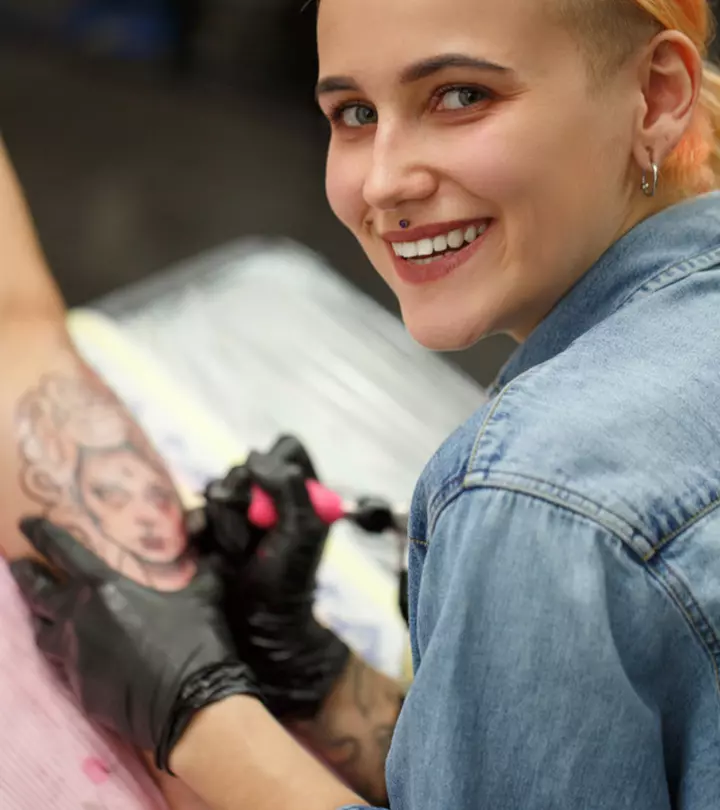
Image: Shutterstock
The art of tattooing is a rich and storied practice, a blend of culture, creativity, and personal expression. Those pondering how to become a tattoo artist embark on a life-changing journey towards transforming their passion into a lifelong career. It is a pursuit that calls for more than just talent—it demands an unwavering dedication to the art.
If you are interested in becoming a tattoo artist, get ready for a challenging and fulfilling journey. This is not just a job; it is a lifestyle characterized by creativity and ongoing learning. This guide aims to steer you through the essentials of kickstarting your career in tattooing. Explore the world of tattoo artistry with insights on honing skills and understanding industry trends to master the craft of inking. Scroll down to read more.
In This Article
What Does A Tattoo Artist Do?

A tattoo artist is a professional who transforms ideas into lasting symbols on the skin. They use their creative eye and careful hand to transform sketches into detailed tattoos that are worn with pride. It is not just about drawing; it is about understanding the body’s contours and how a design will flow with it. The role of a tattoo artist is multifaceted, combining artistry with technical skills and interpersonal communication. They must navigate the clients’ visions, offer guidance on what works best, and ensure every tattoo is executed maintaining proper safety and hygiene guidelines.
When considering how to become a tattoo artist, it is important to understand that it involves much more than simply learning to use a needle. Artists must learn the intricacies of their tools, the nuances of ink in skin, and the importance of creating a comfortable, clean environment for their clients.
 Trivia
TriviaThis profession is not just about making art—it is about providing a personal and permanent service, which is why the trust between an artist and a client is as essential as the quality of the work produced. Let’s learn more about how to become a tattoo artist.
Key Takeaways
- Becoming a tattoo artist requires artistic skill, hands-on training, and adherence to health protocols.
- An apprenticeship, lasting 1-3 years, is a common path for gaining tattooing experience.
- Licensing is essential and varies by location, often including health and safety exams.
- Artists can practice on synthetic skin or fruit before tattooing clients.
- Tattoo styles range from traditional and realism to new school and blackwork, each requiring unique skills.
- Building a quality portfolio is crucial for showcasing artistry and attracting clients.
How To Become A Tattoo Artist
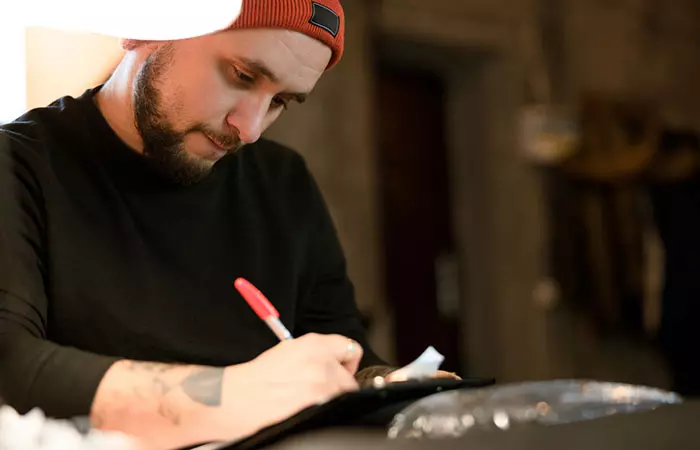
The question of how to become a tattoo artist does not have a one-size-fits-all answer. However, here is a breakdown of the common steps on how to become a tattoo artist:
- Develop Your Art Skills: Besides improving your drawing and sketching, explore various art mediums to broaden your creative range. Understanding color theory and composition will also enhance your ability to create eye-catching tattoos.
- Study Tattooing Fundamentals: Delve into different tattooing techniques like traditional, realism, and tribal. Being familiar with different styles, cultural, and aesthetic aspects will enable you to cater to a wide range of client requests.
- Get An Apprenticeship: Treat this period like a real job; show initiative, be punctual, and absorb as much knowledge as possible. Ask questions, seek feedback, and take every opportunity to watch your mentor at work.
- Obtain Your License: This might involve paperwork, fees, and possibly a practical exam, depending on your location. Keep records of all your certifications and renewals as part of your professional documentation. It is important to understand the laws and regulations surrounding tattooing to ensure the safety of you and your clients, and to avoid legal issues.
- Build A Portfolio: Include black and gray and color works to show versatility. Ensure your portfolio is well-organized and presentable, reflecting your professionalism.
- Understand Equipment: Experiment with different brands and types of machines to find what feels most comfortable for you. Also, learn about the maintenance of your equipment to ensure it’s always in top working condition.
- Learn About Aftercare: Provide written tattoo aftercare instructions for your clients, and be ready to answer any questions they may have. Staying informed about the best aftercare products and methods is essential for the longevity of your tattoos.
- Stay Informed And Keep Learning: Subscribe to industry magazines, follow online forums, and do not shy away from new methods like digital tattoo design. Being open to new ideas can lead to innovative tattooing techniques that set you apart.
- Start Small And Practice: Focus on mastering straight lines and solid fills on synthetic skins before attempting more complex designs. Remember, the goal is not speed but precision and confidence in your technique.
- Network And Market Yourself: Create a professional website to complement your social media presence, offering a more comprehensive portfolio review. Do not underestimate the power of word-of-mouth; encourage satisfied clients to refer others to you.
- Focus On Continuous Improvement: Seek constructive criticism from more experienced tattoo artists and use it to refine your work. Attend workshops and seminars to stay updated on the newest tattooing techniques and industry standards.
By diligently following these steps and consistently adding to your skills and knowledge, you will be well on your way to mastering the art of tattooing. Remember, practice makes perfect, and persistence is key. Keep pushing your limits; your efforts will surely pay off as you grow in this vibrant and creative field.
Becoming a professional tattoo artist is no easy feat but with practice, research, and understanding you can learn the ropes of it. Let’s now take a look at the different niches that you can specialize in,
Types Of Tattoo Artists
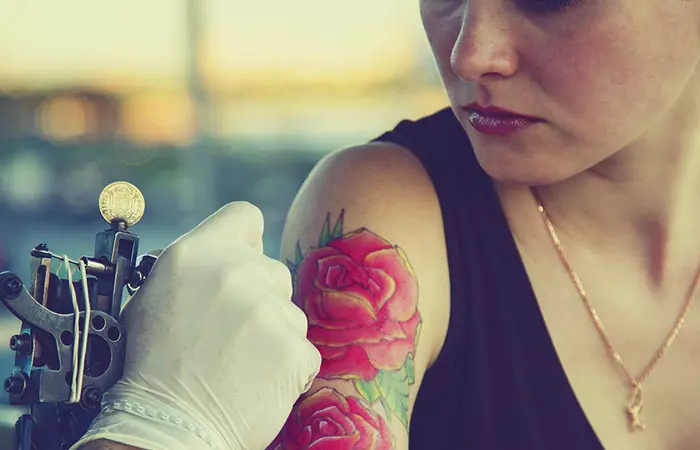
One of the most fascinating parts of exploring how to become a tattoo artist is seeing the variety within the profession. Experienced tattoo artists often specialize in specific styles that reflect their unique skills and interests. Let us talk about a few common types:
- Traditional Tattoo Artists: These folks work with bold lines and bright colors. Think classic sailor tattoos or designs that look like they have jumped out of a vintage tattoo flash sheet. They are all about keeping the old-school tattooing tradition alive.
- Realism Tattoo Artists: If you have ever seen a tattoo that looks like a photograph, that is the handiwork of a realism artist. They are wizards at shading and creating lifelike images, whether it is a person’s face or a slice of nature.
- Tribal Tattoo Artists: These artists are steeped in the history of tattooing, creating designs with black ink that often have cultural significance. Patterns and symbolism typically characterize their work.
- New School Tattoo Artists: Think of the funky, cartoonish designs with exaggerated proportions and wild colors. These artists are not afraid to get playful and push boundaries with their vibrant designs.
- Japanese Tattoo Artists: They specialize in traditional Japanese designs like koi fish, dragons, and cherry blossoms. Their work is often extensive and detailed, telling a story through the imagery.
- Lettering Tattoo Artists: Calligraphy on the skin–that is what these artists are all about. They have a steady hand and an eye for typography, creating everything from elegant script to edgy graffiti-style writing.
- Watercolor Tattoo Artists: These artists are like the Impressionist painters of the tattoo world. They create designs that look like they have been painted with a watercolor brush, with subtle color gradients and a soft, dreamy feel. Their tattoos often lack the traditional bold outlines, relying instead on color and texture to define shapes.
- Blackwork Tattoo Artists: Specializing in solid black ink designs, blackwork artists create bold tattoos with varying line weights and negative space. This style can range from tribal designs to modern geometric patterns and often includes illustrative elements or silhouetted shapes. It is a striking choice for those seeking high-contrast body art.
Each type of tattoo artist brings a distinct skill set and creative approach to the table. As you consider how to become a tattoo artist, it’s worth noting that specializing in a particular style can help you stand out and attract clients who are looking for your unique brand of artistry.
 Did You Know?
Did You Know?Whichever path you choose, make sure it aligns with your personal artistic vision and the kind of work you will be excited to create every day. In the next section, learn about the tips all beginner tattoo artists must keep in mind. Check it out below.
Tips For Beginner Tattoo Artists
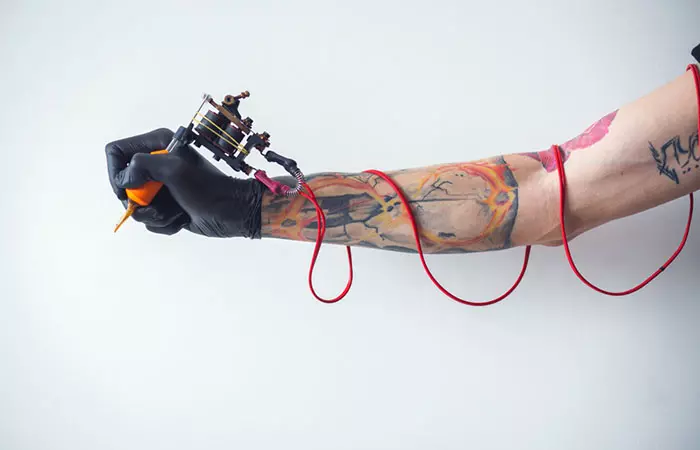
Embarking on the journey of how to become a tattoo artist is thrilling, but it can also be dotted with questions and uncertainties. If you are a beginner, here are some clear-cut tips to set you on the right path:
- Practice Drawing Daily: Before you even touch a tattoo machine, get comfortable with your pen or pencil. Sketch anything and everything. The more you draw, the better your tattoo designs will become.
- Understand The Skin: As a canvas, the skin is unique. Study how it stretches and heals and how different areas of the body can affect the appearance of your ink.
- Start With The Basics: Take your time with complex designs. Begin with simple tattoos and perfect your technique from there. Remember, even the most intricate tattoos comprise basic lines and shapes.
- Invest In Quality Tools: Your tattoo machine, inks, and needles are the foundation of your craft. Choose well-made equipment that you are comfortable using and take the time to learn how to maintain it properly.
- Get Familiar With Safety Standards: Know the importance of sterilization and preventing cross-contamination. Your client’s health and safety should always be your top priority.
- Seek Feedback: Do not be shy about asking for constructive criticism. Feedback from peers and mentors is invaluable for growth. Stay open to learning and refining your skills.
- Never Stop Learning: Attend workshops, watch tutorials, and read up on the latest industry trends. The tattoo world is dynamic, and staying updated is crucial in evolving as an artist.
- Be Patient: Greatness takes time. Do not get discouraged by initial challenges. Patience and perseverance are your allies on this creative voyage.
As you learn how to become a tattoo artist, remember these tips. They will help guide your practice, enhance your skills, and pave the way to a successful career in tattooing.
Stay dedicated to your art, respect the craft, and enjoy the process of leaving a lasting mark on your clients—and the world of tattooing. All career choices come with their own advantages and disadvantages and the tattoo industry is no different. Check out the pros and cons in the section below.
Pros And Cons Of Being A Tattoo Artist
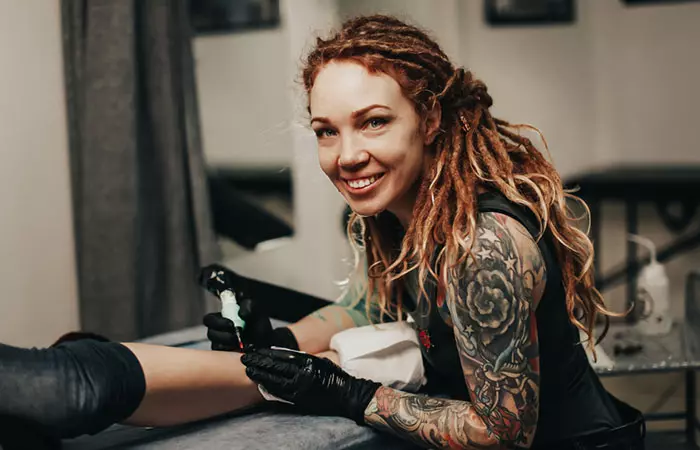
Becoming a tattoo artist is an experience filled with its own set of highs and lows. Here’s a straightforward look at the pros and cons of this unique profession:
Pros
- Creative Expression: As a tattoo artist, your job is to create art every day. You get to transform personal stories and ideas into meaningful tattoos.
- Flexibility: You often have the freedom to set your own hours and choose the projects that excite you.
- Client Interactions: You will meet people from all walks of life and form connections that may last a lifetime.
- Continuous Learning: The tattoo industry is constantly evolving, offering endless opportunities to learn new styles and techniques.
- Potential For Good Income: With skill and reputation, you can command high prices for your work, especially as you gain experience and clientele.
Cons
- Competitive Field: Breaking into the industry can be challenging, requiring persistence and resilience.
- Physically Demanding: Hours of tattooing can take a toll on your back, neck, and hands.
- Health Risks: As tattoo artists and professionals, you play a crucial role in maintaining strict hygiene standards to prevent the occurrence of infected tattoos and cross-contamination. Failure to do so can lead to serious health risks for our clients and tarnish our professional reputation.
- Client Expectations: Managing expectations and dealing with diverse personalities can be challenging.
- Irregular Income: Especially when starting out, income can be inconsistent as you build your portfolio and client base.
If you are considering how to become a tattoo artist, weigh these pros and cons carefully. The journey is demanding, but for those with a passion for art and a commitment to mastering their craft, the rewards of a career in tattooing can be truly fulfilling.
After learning about the process of becoming a tattoo artist and weighing the pros and cons of being in the industry, let’s discuss the time it takes to become one.
How Long Does It Take To Become A Tattoo Artist?
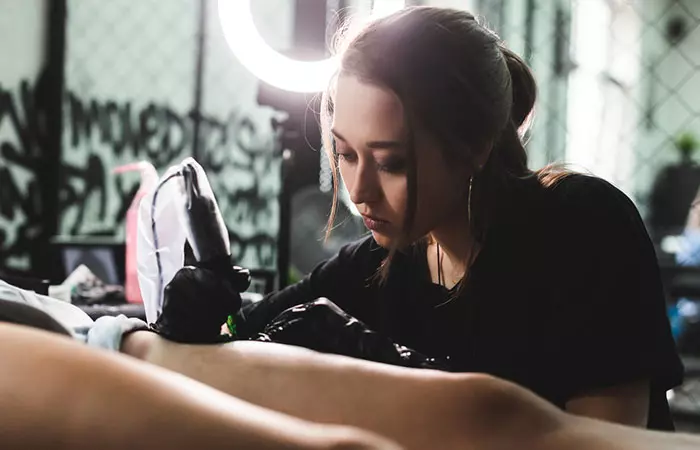
The journey to become a tattoo artist is not a sprint; it is more of a marathon. The time it takes can vary widely depending on several factors, including your dedication, your chosen learning path, and how quickly you master the necessary skills.
For starters, if you are diving into an apprenticeship, it could take anywhere from one to three years. This traditional route gives you hands-on experience under the guidance of an experienced artist. If you are diligent and soak up the skills quickly, you might be on the faster end of that scale.
Alternatively, going the self-taught route or taking an online course might fast-track your learning process, especially if you are disciplined in your practice. However, even if you are a quick learner, there is no substitute for real-world experience. Expect to spend significant time perfecting your technique on practice skins before moving on to human canvases.
Let’s not forget about the administrative side, either. Getting your certification and licensing in order can also add to the timeline. Depending on where you live, meeting the legal requirements to become a tattoo artist can add several months to your journey.
On average, you are looking at two to three years before you can call yourself a professional tattoo artist. Patience is key here. Take your time to learn the ropes properly, and you will set yourself up for a successful career in the tattoo industry.
The path to becoming a tattoo artist is as unique as the tattoo designs you will ink onto others’ skin. It is a path that requires dedication, practice, and a dash of creativity. Remember, it is not just about picking up a tattoo machine; it is about embracing an art form as old as civilization.
As a tattoo artist, you embark on a lifelong journey of learning. Each tattoo you create is a new chapter in your artistic progression. It involves understanding the delicate dance of your tattoo pen on the skin, the confidence to leave permanent marks, and the humility to keep growing with every piece.
As you step into this world, be patient with yourself and persistent in your goals. The road to becoming a tattoo artist might not be the quickest, but it is rich with potential and the promise of a one-of-a-kind career. So, gear up, keep honing your skills, and prepare to make your mark on the industry and your future clients.
Frequently Asked Questions
How much does a tattoo artist make?
The income of a tattoo artist can vary significantly based on location, experience, and popularity. On average, a tattoo artist might earn anywhere from $30,000 to $50,000 annually, with more experienced artists earning upwards of $100,000 annually. Some high-demand artists can charge per piece, commanding hefty fees for their work.
How old do you have to be to be a tattoo artist?
The minimum age to become a tattoo artist is typically 18 years old. This is mainly due to legal and ethical standards, as tattooing is a form of body modification that requires an adult’s consent.
Do you have to go to college to be a tattoo artist?
No, you need not attend college to become a tattoo artist. However, you need artistry skills, technical knowledge, and health and safety training. College courses in art and design can be beneficial, but they are not a requirement for entering the field.
How can I practice tattooing without clients?
You can use synthetic skin or fruit like bananas or oranges to practice tattooing without clients. These materials can simulate human skin, allowing you to practice your technique and build a portfolio without working on actual people.
Illustration: How To Become A Tattoo Artist
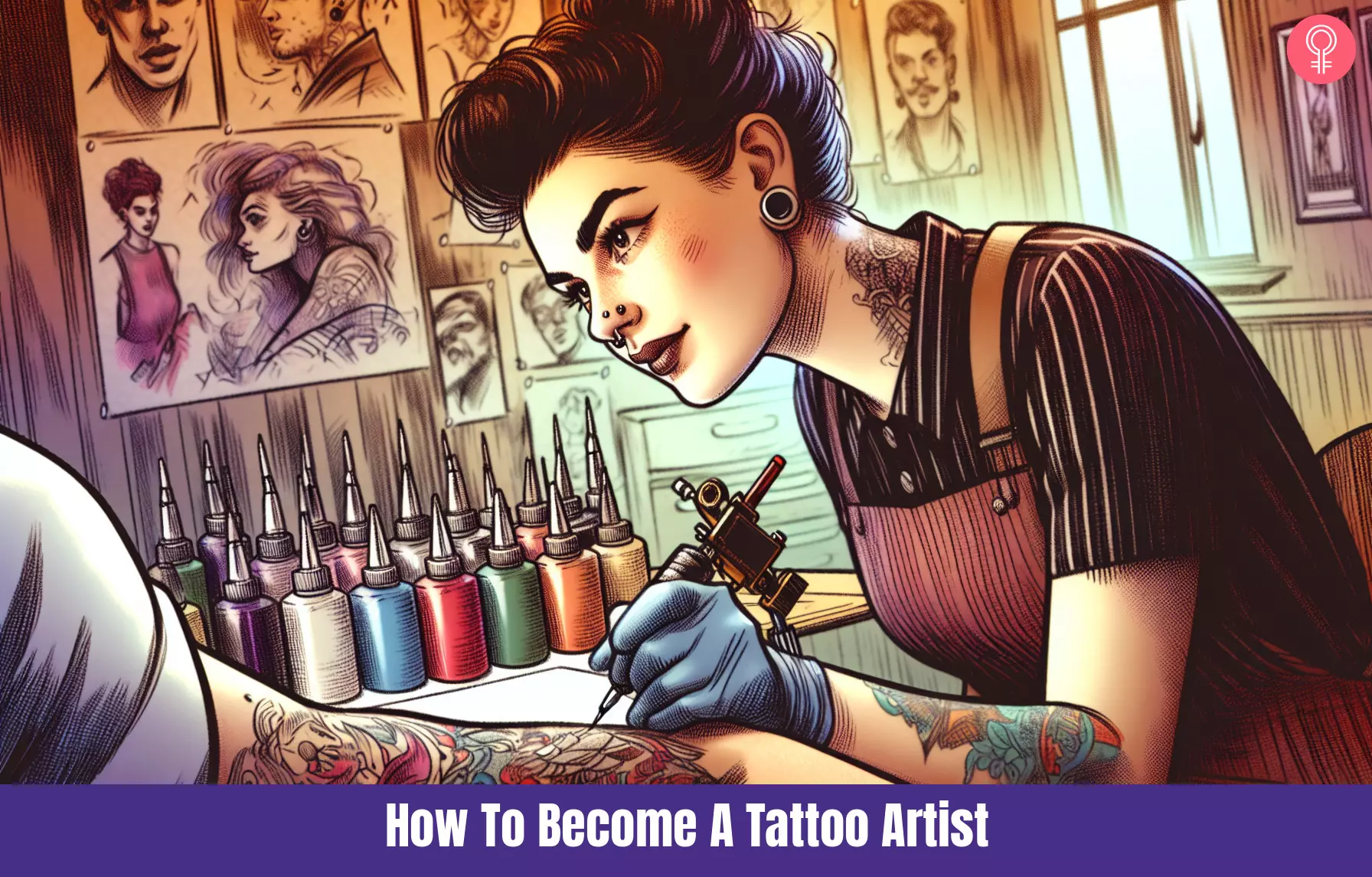
Image: Dall·E/StyleCraze Design Team
A beginner tattoo artist will have more questions than answers about how to start and progress toward the goal of becoming a professional tattoo artist. Here is an informative video answering a few questions that commonly pop up. Check it out below.
Read full bio of Rodrigo Casco
Read full bio of Aparna Harry
Read full bio of Shatabdi Bhattacharya
Read full bio of Pahul Nanra





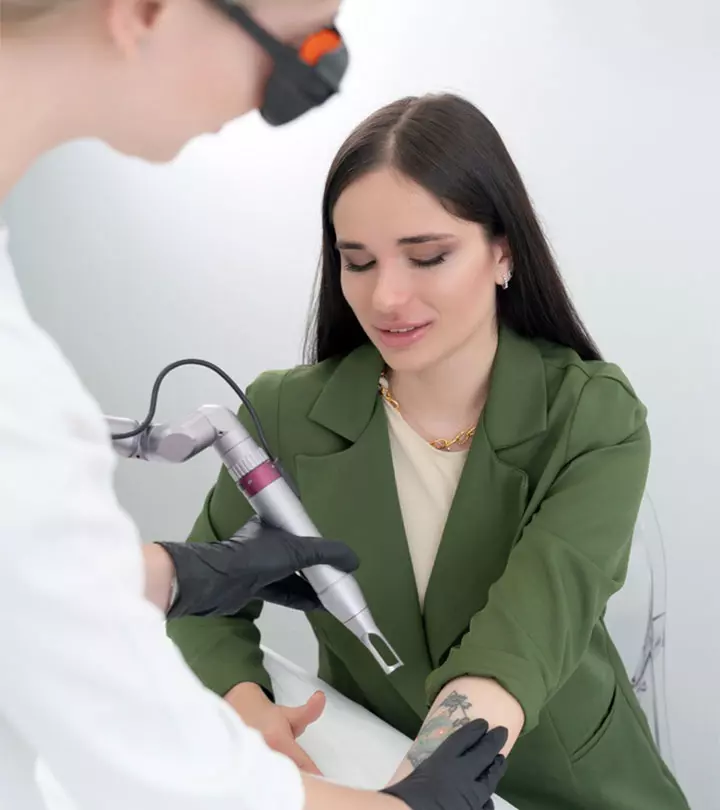

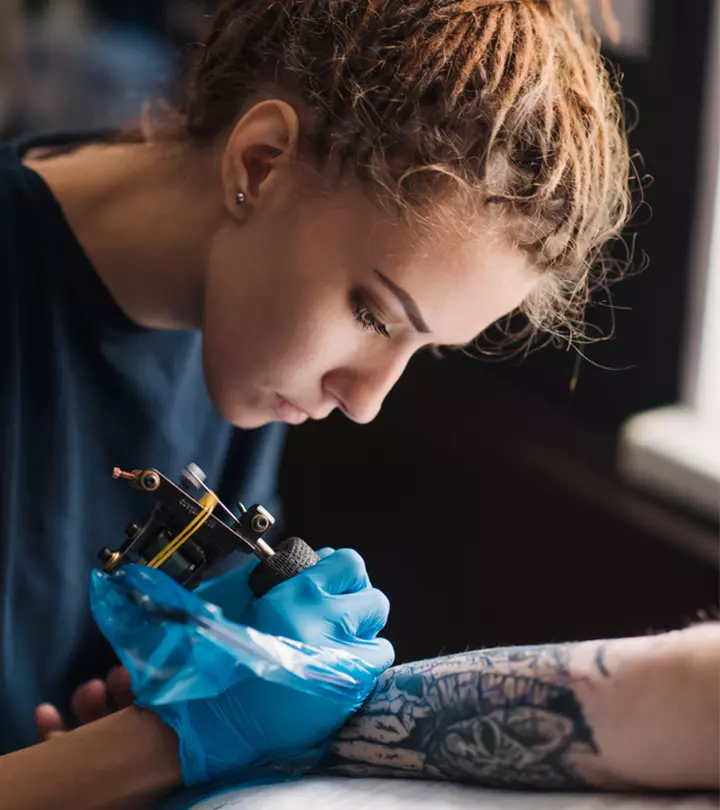
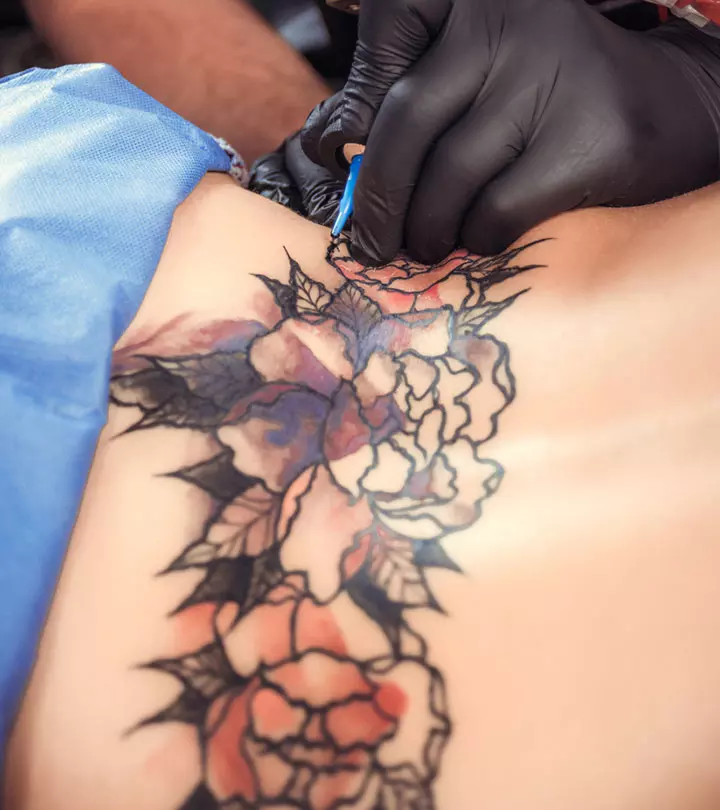

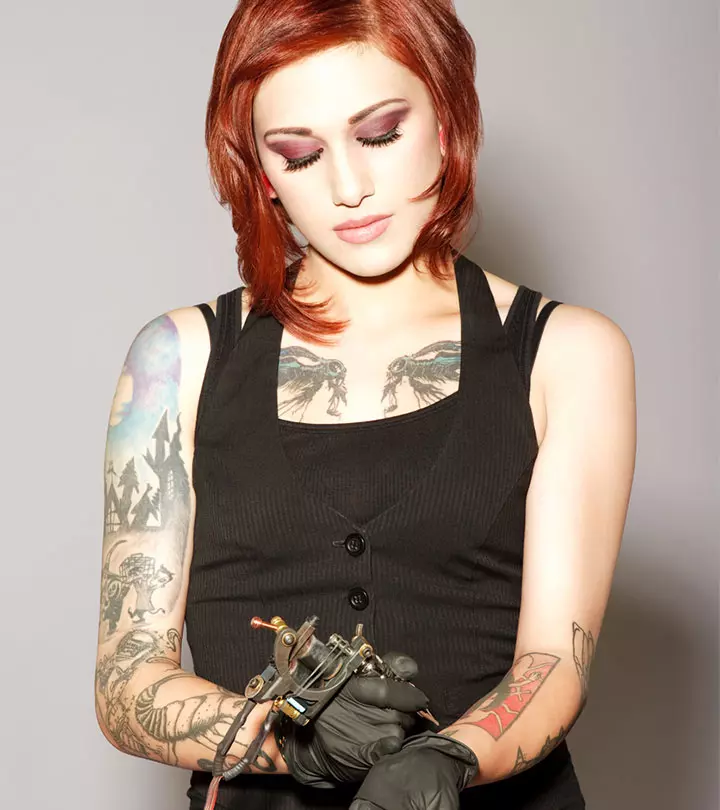

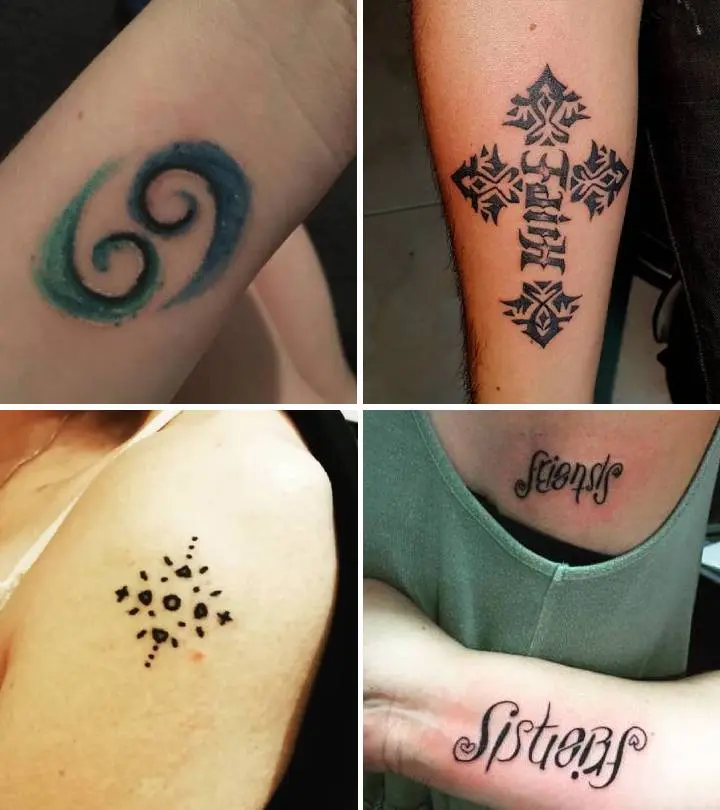

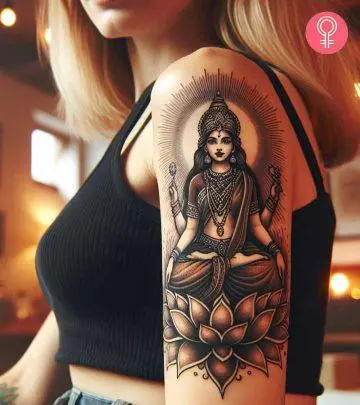
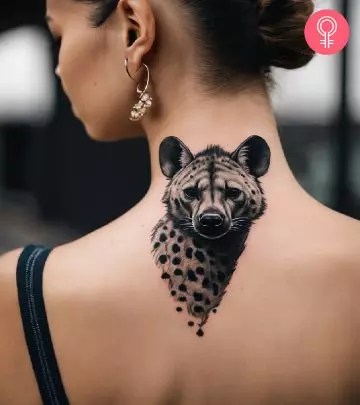
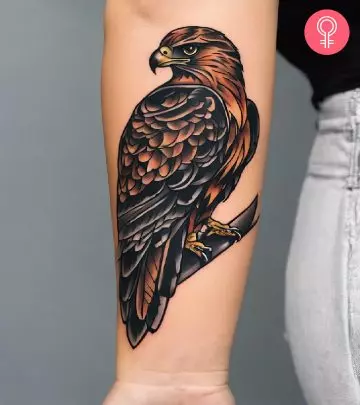
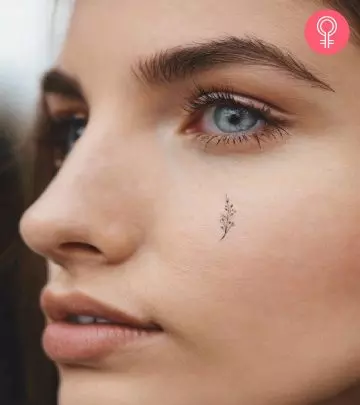
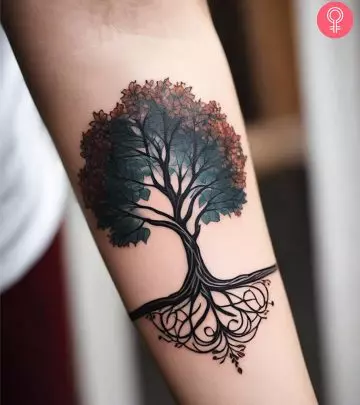
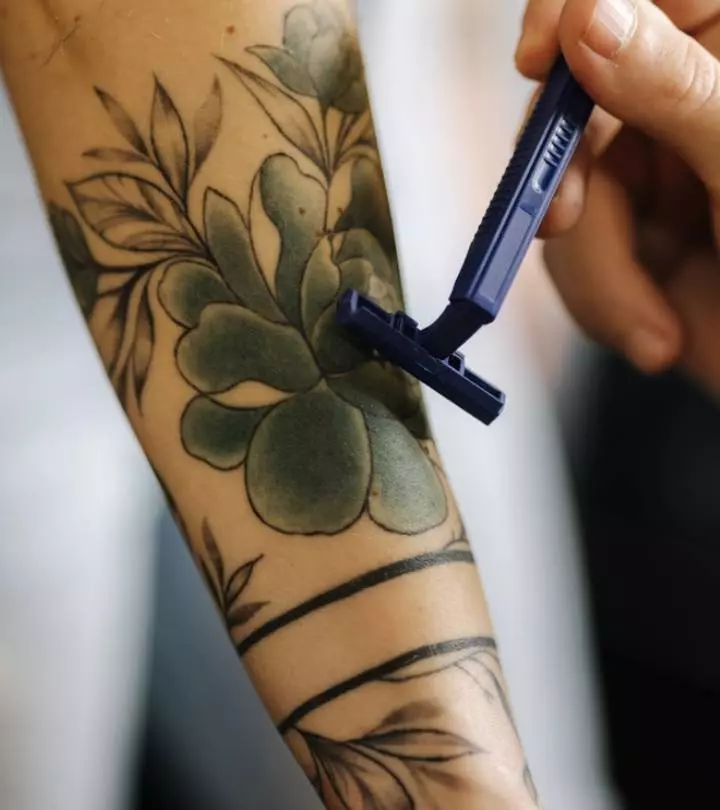
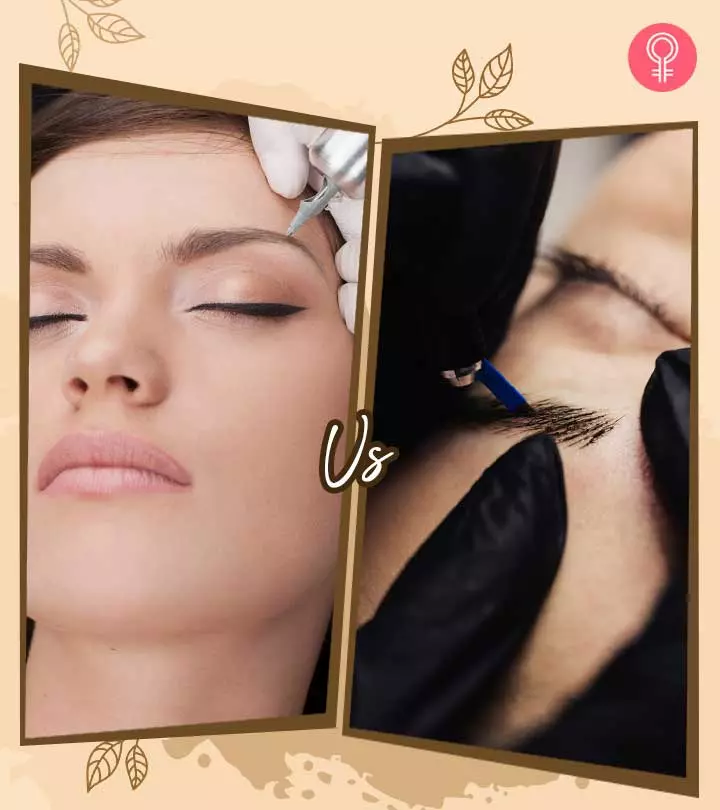
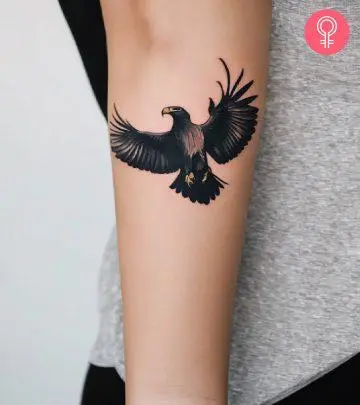
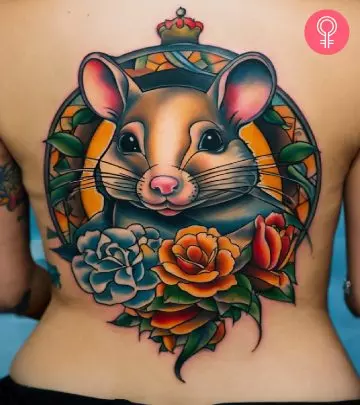
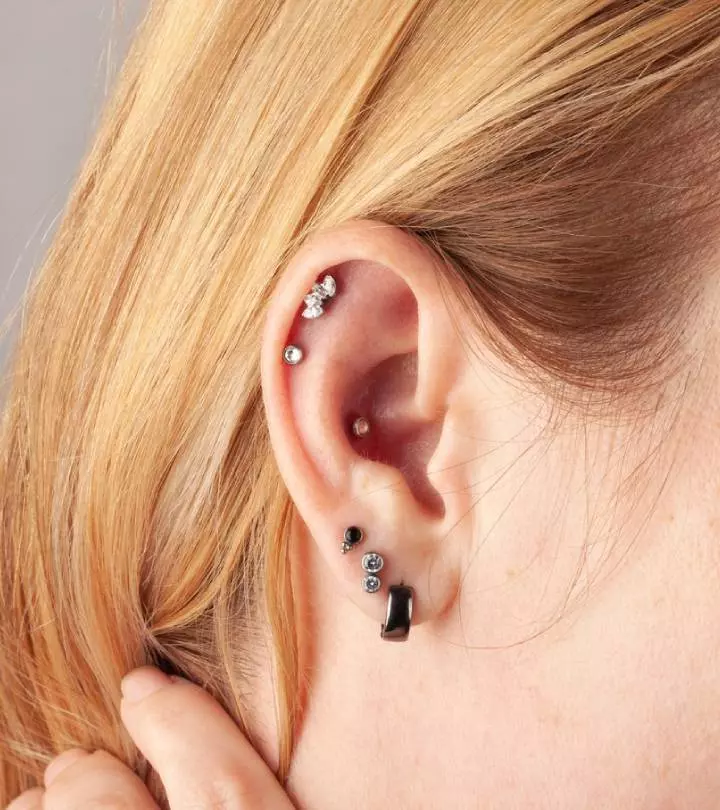

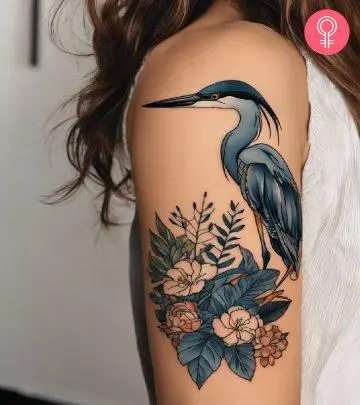
Community Experiences
Join the conversation and become a part of our empowering community! Share your stories, experiences, and insights to connect with other beauty, lifestyle, and health enthusiasts.